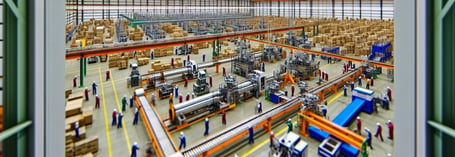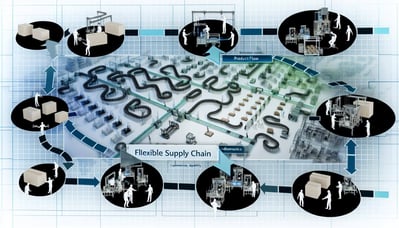Topics: Industrial Manufacturing, PlanetTogether Software, Reduced Lead Times, Integrating PlanetTogether, Agility and Adaptability, Proactive Risk Management, Optimized Inventory Levels, Increased Production Efficiency, Flexible Supply Chains
The ability to adapt and respond swiftly to changes in demand, disruptions in supply, and market dynamics is essential in industrial manufacturing. As a Supply Chain Manager, you're constantly challenged to optimize operations while ensuring resilience against unforeseen challenges.
In this blog, we look into the concept of flexible supply chains and explore how integrating advanced planning and enterprise resource planning (ERP) systems like PlanetTogether with leading platforms such as SAP, Oracle, Microsoft, Kinaxis, Aveva, and others can empower you to navigate these complexities with agility and efficiency.

Gone are the days when rigid, linear supply chains could effectively meet the demands of today's dynamic market environment. The traditional approach of forecasting demand far into the future and relying on fixed production schedules often leads to inefficiencies, excess inventory, and missed opportunities. Flexible supply chains, on the other hand, prioritize adaptability and responsiveness, allowing manufacturers to quickly adjust production schedules, allocate resources, and optimize inventory levels in real-time.
At the heart of a flexible supply chain is the seamless integration of people, processes, and technologies. By breaking down silos and fostering collaboration across departments and partners, manufacturers can gain end-to-end visibility into their supply chain operations, enabling them to make informed decisions and proactively address challenges as they arise.

Advanced planning systems, such as PlanetTogether, play a crucial role in enabling flexible supply chains by providing robust tools for demand forecasting, production planning, scheduling, and optimization. These systems leverage sophisticated algorithms and data analytics to analyze historical trends, market dynamics, and real-time data from across the supply chain, allowing manufacturers to generate accurate demand forecasts and create optimized production plans that align with business goals and customer demands.
By integrating PlanetTogether with ERP systems like SAP, Oracle, Microsoft Dynamics, Kinaxis RapidResponse, Aveva MES, and others, manufacturers can achieve seamless data flow and synchronization between planning and execution processes. This integration enables real-time visibility into inventory levels, production status, and supply chain performance metrics, empowering Supply Chain Managers to make data-driven decisions and quickly adjust plans in response to changing conditions.

Real-Time Visibility: Integration between advanced planning and ERP systems provides real-time visibility into all aspects of the supply chain, from raw material procurement to finished goods distribution. This visibility enables Supply Chain Managers to identify bottlenecks, track inventory levels, and monitor production progress, allowing them to proactively address issues and optimize resource allocation.
Improved Decision-Making: With access to accurate and up-to-date data, Supply Chain Managers can make informed decisions regarding production schedules, inventory management, and resource allocation. By leveraging advanced analytics and predictive modeling capabilities, manufacturers can identify trends, anticipate demand fluctuations, and mitigate supply chain risks, ensuring smooth operations and customer satisfaction.
Enhanced Collaboration: Integrated planning and ERP systems facilitate collaboration and communication across departments and supply chain partners. By providing a single source of truth for supply chain data, manufacturers can streamline communication, minimize errors, and foster collaboration between sales, production, procurement, and logistics teams, leading to improved efficiency and productivity.
Agility and Adaptability: Perhaps the most significant benefit of integrating advanced planning with ERP systems is the ability to quickly adapt to changing market conditions and customer demands. By automating routine planning tasks and leveraging scenario analysis and "what-if" modeling capabilities, manufacturers can simulate different scenarios, evaluate the impact of various decisions, and identify the most optimal course of action, ensuring agility and resilience in the face of uncertainty.
In the unpredictable business environment, building a flexible and resilient supply chain is no longer optional—it's imperative for survival and success. By embracing the principles of flexibility, integration, and collaboration, industrial manufacturing facilities can leverage advanced planning systems like PlanetTogether in tandem with leading ERP platforms to optimize their supply chain operations, mitigate risks, and seize opportunities for growth.
As a Supply Chain Manager, you have the power to drive transformation and lead your organization towards a more agile and adaptive supply chain model. By investing in the right technologies and fostering a culture of innovation and collaboration, you can position your company for long-term success in an increasingly competitive marketplace.
Are you ready to take your manufacturing operations to the next level? Contact us today to learn more about how PlanetTogether can help you achieve your goals and drive success in your industry.
Topics: Industrial Manufacturing, PlanetTogether Software, Reduced Lead Times, Integrating PlanetTogether, Agility and Adaptability, Proactive Risk Management, Optimized Inventory Levels, Increased Production Efficiency, Flexible Supply Chains
0 Comments
No video selected
Select a video type in the sidebar.







LEAVE A COMMENT